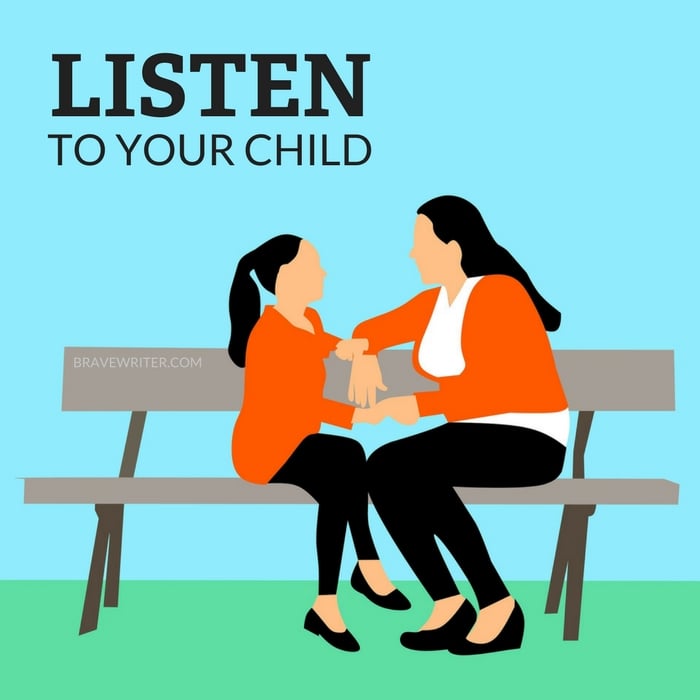One Mouth, Two Ears

The saying goes that listening must be more important than talking because we have two ears and one mouth. That rubric is certainly true with children. When they talk, they are learning. When you talk, they are drinking at a fire hose!
Of course you have to explain ideas or instructions, and there are times when your kids are hanging by your every word, eager for the end of the story or the explanation of an idea or event that they can’t discover alone.
Yet the most important part of your writing program has to be helping your children find a reason to talk to you. Many of them do already, which is a good start. But you can’t tune out and rearrange your spice drawer in your imagination while they recite how they beat level two on Halo. You have to pay attention and engage.
It’s difficult to listen to our kids. Our own heads are full of important information, dates and times of appointments, and the slew of worries that beset adults in long-term-committed relationships and who also run households. Worse, some of our kids talk in ways that remind us of nails scratching on a blackboard (loud, disorganized, rambly, details without context, information we don’t care about, ums and uhhs, wiggling the body while talking).
Your goal isn’t to transform into a perfect parent (we all get bored at times by our children). Your goal is to raise the level of intentionality. Deliberately listen sometimes. Pay good attention. Give feedback that makes it apparent you were listening (don’t shush, control, or revise the output; receive it).
You want to say words like:
- Hmm. I never considered that.
- Oh!
- How amazing!
- What happened next?
- Youch!
- Were you surprised (scared, mad, amazed, thrilled, sad, confused…)?
- And then what happened?
- What did you think about that?
- What did you say to that?
- How many (how big, how far, how much time, how long, how challenging, how easy, how precise, how carelessly, how tricky…)?
- Geesh!
- Oo la la!
- Oh boy!
- You have to be kidding me!
- You must be (so good at it, so happy you went, so angry you lost, so thrilled you got to participate, so relieved you found it, so surprised you were included, so impressed with yourself, so disappointed by this experience, so eager to try again, so done, so ready to tell your sister all about it).
Your job is to NOT say:
- That’s absurd.
- You should never do that.
- I don’t understand why you did it that way.
- That sounds so boring.
- Why would you spend your time doing that?
- I hate that!
- Oh yuck. Stop talking. You are grossing me out.
- You need to be (more careful, quicker, less impatient, quieter, a better worker, nicer, more interested in books than computers).
- Go talk to your friends.
- Not now, later.
- Hurry up and finish. I have things to do.
Don’t make hand gestures that make your kiddos rush through their tale. Don’t roll your eyes or click your tongue or let your eyes wander back to the computer screen.
Be present.


















